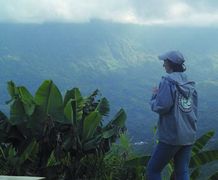Article published in the special Newsletter '15 years of PBI', October 2009
Louise Winstanley, volunteer from Great Britain (2004-6)
The lawyers of the Corporation Judicial Freedom (CJL) have spent years compiling cases on extrajudicial killings.
I will never forget the clothes of the children thrown around the courtyard of a small and very poor farm, where 14 members of a family lived. They were not all at home that fateful night, when it is asserted that the Army entered and shot everyone except the mother, her baby and a two-year-old boy. They riddled the father, brothers, sisters and young pregnant wife with bullets: eight people in total. There was blood on the walls, the floor and the bed. When we asked the lawyer, he said that it appeared that they had been assassinated in their beds.
This was a disturbing accompaniment that PBI had been asked to carry out with little warning. One of the lawyers that worked for CJL, a group of lawyers in Medellín that PBI has accompanied for many years, had received a telephone call and a visit from the mother asking him to accept the case of the assassination of her family, which was attributed to the army. He had to visit the crime scene and collect evidence, and we had to walk for six hours in the mountains of Antioquia in order to accompany him in this task.
This lawyer had been working for several years compiling cases of extrajudicial killings, many of which were what are known in Colombia as false positives: cases of innocent civilians assassinated by the army, who are then dressed in guerrilla uniforms. Weapons are placed at their side to pass them off as killed in combat. These would be added to the figures of the guerrilla felled by a particular army unit and the battalion would subsequently receive a reward. The questionable practice of offering rewards is regulated in Ministerial Directive Number 029 of 20051.
PBI’s accompaniment in this situation was essential because the lawyer was compiling cases of extrajudicial execution against the same unit that controlled the area where we were going to travel. Given the dangers that human rights defenders confront on a daily basis, it would have been very risky for him to venture alone into this remote region of Antioquia where not even basic means of communication exist.
Every day a person dies victim to an extrajudicial killing in Colombia
According to the Coordination Colombia-Europe-United States2, the period from January 2007 to June 2008 was the worst in terms of reports of extra-judicial executions: 535 people were assassinated by the state security forces, that is to say, an average of one per day. Many victims were small farmers, or young people from poor neighbourhoods, who responded to false offers of work in other areas of the country and who were then executed by members of the Army, presenting them as guerrillas.
--
1 «Ministerial Directive 029 of 2005», El Espectador newspaper, 1 November 2008
2 Coordination Colombia-Europe-United States (CCEEU): Observing, bulletin No 6, October 2008

